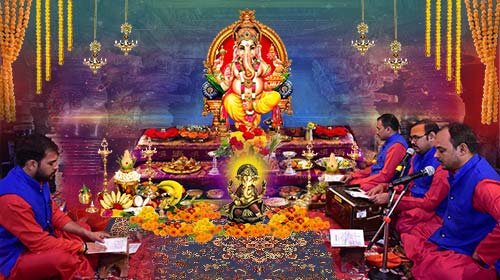
Puja is a prayer ritual that invokes the Divine.
The sights, smells and sounds in the rituals are intended to engage all five senses in one-pointedness. Offerings of various items, ritual procedures and mantras that are made to the deity trigger positive energies and an internal process of transformation within the worshipper. These good energies aim to remove negative influences and open the doorway to positivity that leads to new opportunities for achievement, growth and success.
Let us see how a puja ritual actually connects to the omnipresent divine energy and how the procedure and offerings resonate with its attributes.

Sankalpa is a Sanskrit word that means resolution or firm determination, and it is used to define the puja’s heartfelt intent before it begins. In Sanskrit ‘San’ means good and ‘Kalpa’ means a Shastra or a Veda.
Sankalpa means proposal to do good aided by the Shastras. Sankalpa literally means taking firm decision to accomplish one particular thing in spite of obstacles and challenges in the path with utmost faith in the divine. It comprises of the time, location, planetary place, lineage, the deity, method of performing and the wish of the worshipper.
It is said that if sankalpa is not taken, Lord Indra will receive the puja’s blessings, according to the scriptures. Setting the intent is thus the first step and final purpose of puja.

A Hindu temple has a main altar having niches for various deity statues. The majority of daily worship occurs at home. It is usually placed in North East which is the Ishan kon direction. People wash their hands and feet and wear clean clothes before entering.
According to Vastu Shastra, home altars are based on squares and circles, whereas public temple altars entail a more complex geometrical construction structure, alike rectangles and trapeziums. The three worlds (humans, devas, and heaven) are joined at the moment where the sacred Agni lights the fire before the Ishta Devata of the altar.
This is the main location of worship, where idols, paintings, and other sacred objects are positioned to honor divinity and communicate with the gods.
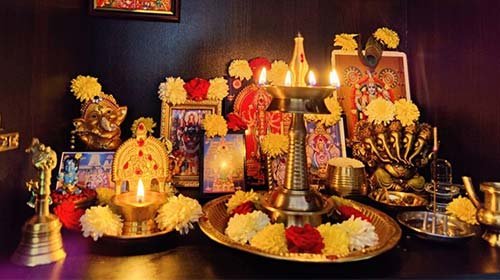
The altar would house multiple Gods and Goddesses in the form of idols made of stone, metal, pictures, or yantra diagrams. The shape signifies a certain energy, and prayer seeks to align the worshipper with that energy.
The first prayer in all pujas and rituals is devoted to Lord Ganesha. Because He is Vighneshvara, the remover of obstacles. This is followed by prayers to Goddess Laxmi who gives blessings for fulfillment of the intent (also called Lakshya in Sanskrit). Their blessings are essential for success of the puja ritual. After prayers to them, other gods and goddesses are invoked and in the last the main presiding deity of the ritual is invoked and worshipped.
The idol or portrait depicts the right attributes of the god, such as their clothing, distinctive traits, equipment, vehicles, and so on. This form creates resonance with your subconscious mind in order to activate those qualities inside you. Lord Ganesha is represented with His pot belly and big ears which relates to stability and grounding, His brother Kartikeya standing up with the Vel relates to dynamism and fearlessness. Goddess Lakshmi sitting on a lotus with elephants pouring water over Her is a form of prosperity and purity. God Hanuman holding a mace and the image of Ram and Sita engraved on His chest close to His heart is a form of eternal devotion. Goddess Durga riding a lion with weapons from all the gods is a form of supreme power and victory. God Krishna in an informal attire with garlands of flowers while playing a flute is a form of joy and peace transcending mundane concerns. And Lord Shiva with a third eye on forehead, Bhasma on His body and wearing Rudraksha beads, a tiger skin and snake around His neck and Ganges flowing over Him is a symbol of detachment, fearlessness, purity and awakening.
The form of the deity allows for communion between the devotee and the divine. Through various offerings, the deity is invited to be present throughout the puja, and at the end of the puja, he is surrendered to with gratitude and His blessings sought. An Uttar Puja or Uttaravahan Puja is then done to thank the Divinity, ask forgiveness and request Him to go back to His abode. Then the offerings are partaken that bear His blessings.

Once the intention is clear (sankalpa), the place is prepared (altar), and the deities to be invoked have been seated as idols or pictures or yantras we must connect with these energies with bhava (emotion) in order to communicate with the divine. This is accomplished by sitting in utmost reverence before the deity and gazing into His eyes, if it is an idol, or concentrating on its center, if it is a yantra.
Holding the hands in the namaste position and remaining silent in front of the divine is the initial step in becoming aware of this heartfelt connection with God. A bell is rung to strengthen this connection while clearing the mind of distractions. Also the devotee prostrates before the god in complete surrender to His presence.

Sanskrit mantras from ancient scriptures are chanted in front of the invoked deities as a form of direct verbal communication with the deity and reverence, as they are the language of the gods and make us resonate with the divine energy. Shanti mantra is a Sanskrit mantra that is usually recited before the beginning of a puja to achieve and spread peace within ourselves and our surroundings. The beneficial effects of these sacred chants from the scriptures cannot be attained by simple mundane language utterance.
Below are examples of beeja mantras chanted to some popular Gods:
God Ganesha – Om Gam Ganapataye Namaha ||
God Kartikeya – Om Saravana bhavaya Namah ||
Goddess Lakshmi – Om Shreem Namah ||
God Krishna – Om Kleem Krishnaaya Namaha ||
Goddess Durga – Om Dum Durgay Namah ||
God Shiva – Om Namah Shivay ||

The practice of performing abhisheka, or pouring liquids on God, began with Lord Shiva on his Lingam form. Nowadays it is done for all gods and goddesses. When carrying out Abhisheka with devotion, your mind is focused. Your heart is filled with the divine image and thoughts. You forget about your body, its relationships, and its surroundings. Egoism gradually fades away. When there is humility, you can begin to enjoy and taste your Ishta devata’s eternal bliss.
Each god and goddess has a specific day on which abhisheka is performed. On Mondays, abhisheka for Lord Shiva is very auspicious. On Tuesdays, there is an abhisheka for Lord Ganesha. On Wednesdays is performed for Lord Krishna. On Fridays, for the goddess Lakshmi. On Saturdays for Lord Hanuman, and so on.
Regardless of the day of the week, abhisheka in various temples devoted to various gods and goddesses is usually done at different days of the week, but it can also be done at any time when true devotion or bhava spurs from our heart.
Abhisheka is now also conducted over any sacred object with Gangajal water and other liquids, and over the family dwelling. It is common practice to perform it over the Sri Yantra and sprinkle blessed liquids and water over the dwelling to purify the place with divine vibrations and remove negative energies.
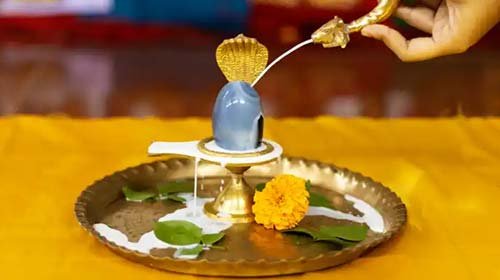
Rudra Abhishek is the earliest form of this procedure and means the holy bath of the Shivling which is done with offerings of a sacred mixture of liquids like Milk, Gangajal (water of River Ganga), Honey, Curd (Yogurt), Sugarcane juice, Sandalwood paste, Belpatra or Bilva Patra (Wood Apple tree leaves), Aromatic Oils, Flowers (Dhatura, Akand) etc. Chanting of Mantras and hymns is an integral part of performing Rudrabhishek. Rudrabishek is considered highly significant amongst Hindus. The vibrations created during this puja are filled with supremely positive, powerful and purifying energy over all other deities and individuals.

Various offerings to God are made to uplift the senses, calm the mind, invigorate the body, and allow divine communication. They have different meanings.
Offerings represent the five elements of nature that can be perceived by the five senses. Therefore, the water element is denoted through the offering of water and other liquids. The earth element is represented by Prasad or bhog or naivedya. The offering of a light or diya represents the fire element. Bhava or emotions served through different offerings denote the vayu, or air element and the sounds of mantra chanting symbolize akasha, or the space element.
When offered sincerely from the heart, these five elements provide prana life force for the deity energy to reside in the idol, picture, or yantra form, allowing
it to fulfill the desired intent. This external process gives new meaning to what one feels through one’s sense organs in order to merge the devotee into divinity, or a non-dual state or presence and manifestation.
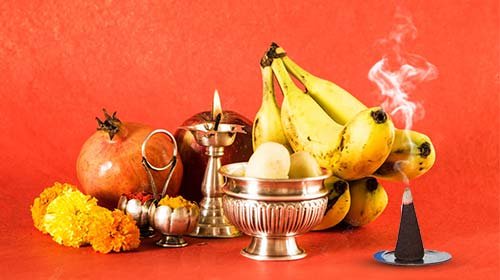
Bell ringing: It focuses attention on the divine principles of the invoked deity and drives away negative energies and emotions.
Lamp lighting: Giving deepam (or light) represents the light that resides inside us, the genuine Self that we offer to God in sincere devotion. It removes darkness, which symbolizes ignorance. Thus light symbolizes knowledge. It enlightens the presence of the deity and our inner self by reflection.
- Oil lamp: It attracts sattvik vibrations a maximum distance of one meter.
- Ghee lamp: It attracts all sattvik vibrations in the surrounding environment.
Incense burning: It clears out the negative energies from the space and uplifts the spirits from the grounding sense of smell. It stabilizes a wandering mind.
Water offering: It represents cleanliness and providing emotional purity from our inner source. It is an act of inner renewal that has the ability to release negative karma from the past.
Milk pouring: It makes to emanate auspiciousness from the deity as raw milk is highly sattvic. It symbolizes pure love to god. Traditionally poured on Shivalingam as the highest expression of deepest love towards the Lord.
Flowers: It symbolizes our gratitude through the beauty of their various colors and fragrances, while inspiring feelings of joy and contentment. It also symbolizes good fortune for us. It is a way of giving ‘something’ (good) to the world that grows inside us as a consequence of performing these things.
The flower we present to the deity symbolizes the good that has blossomed within us. The completion of the puja is also marked by the offering of full flowers.
- Datura makes happy Lord Shiva.
- Lotus makes happy goddess Lakshmi.
- Jasmine makes happy Lord Hanuman.
- Palash makes happy goddess Saraswati.
- Marigold makes happy Lord Ganesha.
- Red Hibiscus makes happy Maha Kali.
Unbroken rice: It represents fullness since it is pure and entire. It is also used as a substitute of offerings not present in the puja.
Sandalwood paste: It symbolizes the giving of something beautiful touched with our own hand. This results in a peaceful atmosphere because sandalwood is calming and helps the devotee in concentrating throughout the puja ritual.
Fruits: It represents placing the results of our actions at the Lord’s feet. This necessarily involves detachment from the material world, devotion, and self-sacrifice and surrender.
Prasad: It is an offering of food, and it is particularly meritorious if it is cooked. It is thereafter distributed to the devotees as the deity’s blessings. The significance of offering food to God is imbued with divine consciousness and spiritual enlightenment. Always be conscious and aware that you are partaking in God’s special grace while eating the Prasad. Therefore, eat it with respect.
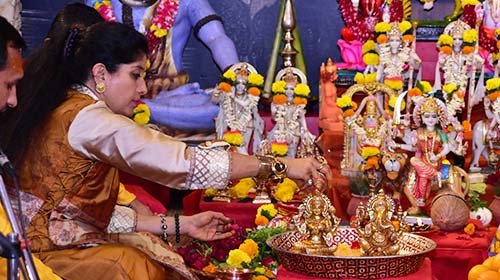
Puja Services by Chakra Yog specializes in conducting authentic Vedic Pujas and Yagnas. We are one of the oldest and most trusted online Puja Services brand in the world. Our core team of Karamkandi Pundits have received gurukul education in Kashi and are well-versed in Sanskrit. They have rich experience in conducting various Pujas such as Deity Pujas, Navgraha Pujas, Siddha Mantra Japas, Festival Pujas, Katha and Paaths and Maha Pujas.
Pujas conducted by us are complete in all ways to include all Vedic rituals such as Sthapana (installing the Deities), Navagraha Mantra Japa, Kalash Puja, Invocation of all Gods and Goddesses, Deity Puja, Recitation of Deity Stotra, Deity mantra Japa and Path and Narvana mantra japas, Pushpanjali, Homa, Yajna and Aarti.
We Offer Puja Services For:
- Gods & Goddesses
- Festivals and Occasions
- Success and Growth
- Prosperity and Abundance
- Protection
- Family Relations
- Health and Well-being
- Navagraha
- Planetary Dosha
All Pujas are performed on appropriate muhurat with proper Sankalp and in accordance with the Vedas. Our result-oriented Pujas blesses Yajamans with peace, good health, material prosperities and spiritual strength.

